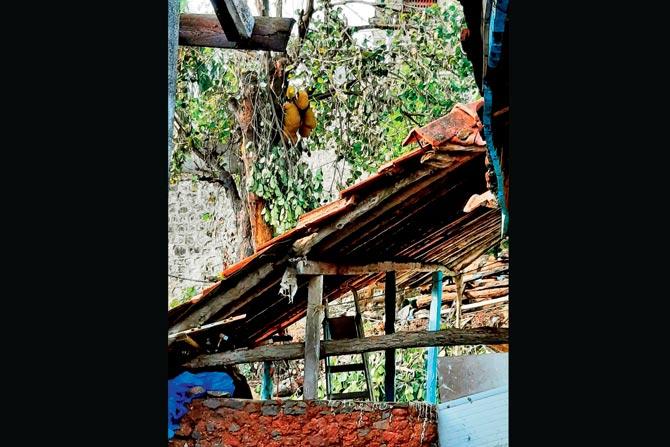Locals miffed by govt-s payout, say they have been offered Rs 180 for a tree that would have yielded more than Rs 30,000 per year

Mango trees that were destroyed in the cyclone
Raigad residents are upset with the state-s meagre compensation for losses in horticulture — mango, cashew and betel nut farming being the main source of livelihood for many.
On average, one mango tree would bring R30,000 and people had a few hundred to thousands of trees. The government-s compensation has come up to only Rs 150 to Rs 180 per tree.
ADVERTISEMENT
Nizamuddin Jalal, a native of Tol village, Mahad taluka, said, "Many villagers from Srivardhan, Murud-Janjira, Goregaon and other parts of Raigad and nearby districts would thrive on the income from mangoes and other fruit farms. Some owned tens to thousands of trees, depending on the land. The cyclone has brought the seasonal income to a halt for the next couple of years."
"The cyclone flattened everything in just a few hours, our houses and livelihood blew in the wind," said Jalal.
"We will have to clear the debris and think about replanting the trees. It would take almost a decade for the new trees to start generating an income. With no labour available the cleaning will be further delayed," said Jalal.
Many villagers have also suffered serious losses to stored foodgrains and spices as the roofs blew away and the top floors of their homes, where the stock was kept, were flooded.
Dr. Wiqar Shaikh, senior allergy and asthma specialist in Mumbai, whose relatives hail from Bankot, the first village in Ratnagiri district, also echoed similar concerns, saying, "Mango orchards have suffered particularly. Around 95 per cent of the fallen trees cannot be replanted. Locals are trying to replant the rest but are doubtful if it will work."
Dr Shaikh added, "Bankot area, like many other parts of Raigad and Ratnagiri districts, relies exclusively on mango trees. Entire villages sustain for a year on the incomes the trees generate. With thousands of trees being uprooted, the only source of income for these people has disappeared.
Other trees like cashew, jackfruit, chikoo, betel nut, etc. have also been damaged. Apart from tin and asbestos sheets, houses with terracotta roofs have also been damaged due to trees falling, Dr Shaikh explained. "Some houses have lost windows and iron grills. It is impossible to obtain replacement material for these damages or even labour to move the trees. The entire damage to Bankot village and surrounding areas, as per the information from local villagers, is estimated to be around R200 crore," said Dr Shaikh.
-Compensate under central plan-
Meanwhile, Mumbai-based NGO Watch Dog Foundation has demanded compensation for mango farmers under the Pradhan Mantri Fasal Bima Yojana, or any other similar scheme.

A jackfruit tree in Bankot village, Ratnagiri
Advocate Godfrey Pimenta, trustee of Watch Dog Foundation claims that there are around 1 lakh hectares of mango orchards, mainly concentrated in Konkan and Marathwada.
Apart from Nisarga, the COVID-19 lockdown and unseasonal rain in October and November 2019 also affected mango produce. "The unseasonal rains affected the development of flowers in mango trees, delaying the production. Farmers had to spend extra to enable the fruit to set in," said Pimenta.
"The lockdown disrupted the trade of every variety of mango. Mangoes were not able to reach any market, be it local, regional or international. Farmers are also facing a shortage of labourers to harvest the crop and of wooden boxes for storage."
The other side
A senior bureaucrat from Raigad-s district administration said, "We must understand that the actual losses, in case of a natural disaster, will always be more than the relief support given by the state administration. In this case too, under the NDRMA norms, the per hectare relief was only Rs 18,000, which has now been increased to R50,000 as per a new GR. A major chunk of the financial aid is coming from the Chief Minister-s Relief Fund."
The government has started distributing 10 kg wheat and 10 kg of rice to cyclone-affected villagers. This is other than the supply coming from Good Samaritans like Roti Bank and others.
"Also, the government wants to ensure that small farmers and those who are not well off are not be pushed back into poverty. It is a known fact that no amount can ever make up for the complete loss, emotional and material. The state and district administration are giving all required support in every way possible," the officer said.
Catch up on all the latest Mumbai news, crime news, current affairs, and a complete guide from food to things to do and events across Mumbai. Also download the new mid-day Android and iOS apps to get latest updates.
Mid-Day is now on Telegram. Click here to join our channel @middayinfomedialtd and stay updated with the latest news
 Subscribe today by clicking the link and stay updated with the latest news!" Click here!
Subscribe today by clicking the link and stay updated with the latest news!" Click here!







